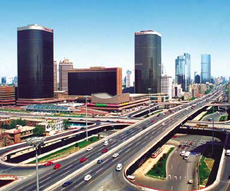
When Carlos Magarinos, the director-general of United Nations Industrial Development Organization (UNIDO), went to Shanghai for the first time in 1995, he was shown by some Western friends the brand new buildings in the Pudong New Area.
Changes in Pudong at that time somewhat represented China's aspirations for prosperity. The buildings were erected to accommodate multinationals anticipated to come to join China's development story.
But doomsayers of China said those buildings were pure bubbles, and they would burst with the collapse of the Chinese economy.
"I recall people said, 'you see all the buildings? I don't know how they are gonna deal with this -- they are all empty.'"
"But you know now they are full of people, full of activities," said Magarinos earlier this month in an exclusive interview with China Daily at a business conference.
Magarinos, who visited China three or four times every year since 1995, also remembered that 10 years ago, many people said the nation was not growing at the rate it proclaimed.
After seeing China's changes during the past 10 years, however, the same people now are saying that China might have been growing faster than its official statistics indicated.
There is an increasing note of optimism about China.
That's something that can also be perceived at the level of international organizations, Magarinos said.
"What explains the problems is the attitude of certain quarters of the international community when they have to examine the evolution of a country like yours (China)," he said.
Some advanced countries were originally reluctant to acknowledge the arrival of a new competitor and the rising of China's economic power, he said.
But what happened more recently is that people realize that to neglect or pretend to ignore such an event was simply counter-productive, he said.
As the head of an international organization, Magarinos observed China's progress with a special indicator the magnitude of poverty reduction.
He said that during 1990 to 2000, worldwide absolute poverty in terms of population those living with 1 US dollar or less per day decreased to 1.27 billion from 1.5 billion.
Most of this was achieved by the progress in China.
"Without growth in this part of the world, the world will have lots of problems to address," he said.
As a new, emerging power, China's behaviour was "cautious, prudent and responsible," he said.
China knows its strength and how much it can progress and at the same time is conscious of shortcomings that still need to be addressed.
The country does not consider itself it has met all the needs of its population.
It is aware that "it still has to manage to bring this prosperity to large proportions of the population who are living inland in the country," Magarinos said.
UNIDO is a partner for China in enhancing the country's industrial capabilities. UNIDO has provided some US$200 million to China in technical assistance.
During the 2001-05 period, technical assistance worth US$80 million was being implemented, which accounts for 20 per cent of UNIDO's global project delivery and 50 per cent of the organization's operations in the Asia-Pacific region.
Magarinos was in Shenzhen for a conference on logistics, organized by the Boao Forum for Asia, where he talked about UNIDO's latest studies on the development of the logistics industry.
Magarinos said China needs to ensure new strategies to pursue new competitive advantages in industrial development and global trade.
The country should meet the challenge of moving from price factors to non-price factors in competing globally by giving stronger support for innovation, he said.
Magarinos, who has held various positions with the Argentine Government and with the country's diplomatic missions serving at UNIDO, has been following economic affairs from his home continent and country.
He said people in Latin American countries where President Hu Jintao visited last month were very excited about it because many see increasing commercial opportunities between China and the area.
Currently many Latin American exports to China are in the sectors of raw materials, energy and agriculture.
However, "I do think (trade) relations between the two regions could go beyond the supply of energy and raw materials from Latin America," he said.
Improving relations with China also "opens room for more complex technology products like aircraft and technology products from Latin American countries."
In fact, Brazilian company Embraer has started to assemble regional aircraft in Harbin in Northeast China.
Magarinos said some Latin American countries have developed a world vision.
"They are trying to sign agreements everywhere with all countries. They are open to competition and have strong policies toward certain market niches."
But many others still need to learn how to penetrate overseas markets by developing new products.
Latin American people are overwhelmed by the size of the Chinese market, he said. But they need to know that the consumption pattern of China has different characteristics.
(China Daily December 24, 2004)
|

